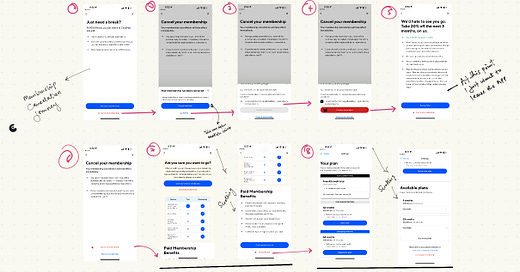Off-boarding is as important as onboarding.
The risk to look out for in when onboarding or off-boarding your customer.
My recent experience with some apps is what prompted this. I’ll talk about two different experiences that come to mind, one that can be improved (ClassPass) and the good practice which is (Hinge).
/ The risk to look out for in both on/offboarding is “desperation.”
Go to the extreme on either end, and you risk seeming too desperate, enough for your customers to think you could sell their identity or be shady. That’s the best way to lose people’s loyalty. Easier said, but hard to implement.
/ Different things matter to different customers.
People want different things, which is why you should be careful not to fixate on what makes the minority uncomfortable and end up losing the majority because you’re trying to keep everyone happy or safe. Some relationships come to an end, and there’s nothing you can do about it. This applies to businesses as well.
/ When a customer decides that terminating their contract with you is the next step, a lot has built up to that moment.
What’s really important is making sure you have everything in place so they leave happily. Both parties should feel heard. This benefits the business as well because you can collect unfiltered information that helps improve your services in the long run. If you leave a good impression during off-boarding, people might even come back or refer you to others.
/ ClassPass membership cancellation stood out as an example of desperation.
In my recent encounter, they tried too hard not to let me go, which only reinforced my decision to leave. That’s not all — I had to click through eight steps, scrolling through each before I could make any decision.
/ Hinge, on the other hand, handled it differently.
When I decided online dating wasn’t for me anymore and tried to cancel my account, they offered the option to reset my account instead, essentially clearing out my matching algorithm and starting fresh, which was actually what I needed at the time. And when I finally made up my mind that it still wasn’t for me and decided to close my account again, they didn’t bug me with more offers. I’m sure they knew that at this point, I was done and ready to leave.
You don’t want to be too desperate, nor do you want to just blatantly offer a “Delete account” button that makes it seem like you don’t care at all. The sweet spot is making it easy to leave while ensuring the person feels heard or, to put it in relationship terms, giving them closure. Subtle gestures can be beneficial, like what Hinge did.
/ To conclude, don’t barricade the exit when your customer has decided to leave. There’s a lot of reasoning that built up to the final moment, try to know it. Understand why they’re leaving and use it to improve your service.
If you have an off/onboarding experience you’d like to improve.
Let me know in the comment, I’d love to help.




